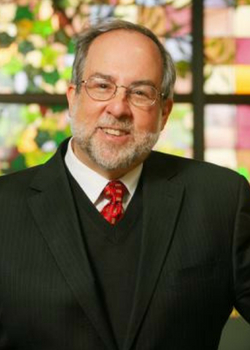The great Israeli author, Shai Agnon, related a fable about a little boy and his old father, who together tended a goat. Each day the goat wandered off, to return at evening, its udders filled with the sweetest of milk. The boy wished to know where the goat went and on what grass it grazed, to give such extraordinarily sweet milk, so he tied a string to the goat's tail and followed. Over hills and through forests they went, until they descended into a dark cave. Down a long, winding path the goat led the boy. Finally, they emerged into the light. The boy recognized that he had entered into a new world, a world of lush hillsides and warm sunshine. Stopping a passerby, he inquired, and was told, "This is the land of Israel!" Elated, the boy wrote a note to his father. "Follow the goat," he instructed, "and join me here in Eretz Yisrael." Tucking the note into the ear of the goat, he sent the goat back, back to the old country, back to his old father. Meanwhile, the father had grown worried at the boy's disappearance. When the goat returned without the boy, he grew distraught. He took the goat to the butcher and had it slaughtered. Only then, did the note drop from the animal's ear. From that day, concludes the tale, the mouth of the magical cave is hidden and no one knows the mystical shortcut to the marvelous Land of Israel.
The bitter sweetness of the tale rings true. We celebrate a blessing this week. But only half a blessing. We have witnessed half a miracle: We have regained our land, our city, our sovereignty. We have gathered the Jewish people from the four corners of the earth. We have made the desert bloom and gained recognition as a "start-up nation." But the blessings of peace, security, independence elude us. What Zionism promised -- a renewed Jewish people reborn in a renewed land of Israel -- seems far beyond our reach.
The irrationality of the situation -- the unending hatred -- touches an old Jewish nerve. It suggest a situation no longer political but existential, no longer diplomatic but metaphysical. It raises an old Jewish fear -- for Jews, the world is an endless nightmare -- irrational, intolerant, absurdly hateful. Once again, we find ourselves in Galut, in exile, helpless inhabitants of a world beyond our powers to control or ameliorate. Once again, we find ourselves unable to protect our children. This was precisely the condition that Zionism set about to cure. This irony is so bitter it elicits waves of rage, fear, depression and despair.
But Jews must not despair. In despair, and in the moral cynicism and brutality it breeds, is our death as a people, as a culture, as a faith. Galut ha-nefesh, the exile of the soul, of our essence, is as lethal as Galut ha-guf, material, political exile.
Go back to your Hagadda and read the verses of Dayenu: "If God had divided the Sea but not brought us across on dry land, Dayenu! It would have been enough!" How could that be? We are an old people and we understand that redemption comes in agonizingly small steps. Each step is precarious and perilous. At each step, there is cause to surrender to despair. But Jews don't despair. God opened the Sea, we found the courage to step in, to step across. We are an old people and we have wrestled long and hard with the God of history. We know that bitter ironies punctuate the story of history. But we don't despair. That's why, each year, we leave Egypt again. We retell the story and re-experience the miracles.
This year, we had help. The best sermon of the Passover holiday was not delivered by a rabbi or magid, but by the President of the United States. His was no policy statement delivered before the K'nesset, but a message to the young of Israel ... a sermon. He dealt not with borders or refugees, but with the attitude of Israel's younger generation. Peace, he demanded, is necessary. Peace is just. And peace, he insisted, is possible. To believe differently, he observed, would be to relinquish something fundamental in Jewish character. "Sometimes, the greatest miracle is recognizing that the world can change. After all, that is a lesson that the world learned from the Jewish people."
It is told that an hour or so before the opening of the First Zionist Congress in Basel, in 1897, Theordore Herzl ordered his aide, David Wolffsohn, to create a banner for the hall's entrance. A stranger to Basel, Wolffsohn had no idea where to find such a thing. He ran and scoured the shops of the city in search of a suitable emblem, but found nothing appropriate. Exhausted and frustrated, he entered a small synagogue to rest a moment. There he saw his emblem. He took a large blue and white tallis, removed the fringes, and with a fountain pen, inscribed a Magen David in the center. Thus, was Israel's flag born. This we know: A country whose flag is a tallis, whose anthem is a prayer of hope, and whose national vision is the ancient dream of the prophets, will yet find its way to peace. If not in our time, then in our children's.
Shabbat Shalom.

